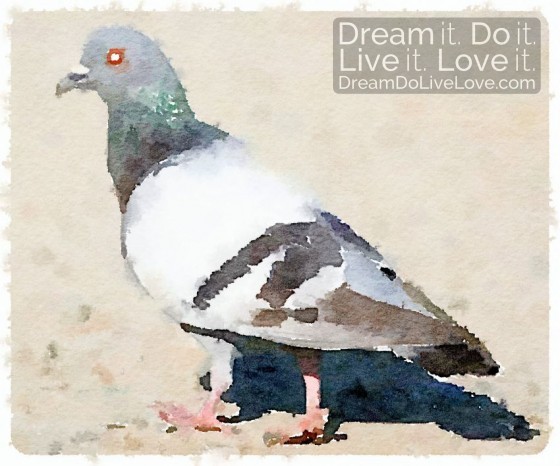Many people aren’t aware that when they begin to make a name for themselves, they are creating a brand… and what’s more, that brand becomes hard to change once it’s become established in people’s minds.
When people begin to learn about you, whether that’s at work or through a personal relationship or through your blog or other ways you’re establishing a reputation… they put you into a pigeonhole in their minds. Once you’re in that pigeonhole, it’s really hard to get out.
by Leo Babauta
It’s not that first impressions are everything — people don’t always pigeonhole you based on the first impression. But as they learn about you, they are finding a pigeonhole for you. And over time (actually, fairly quickly), that pigeonhole gets solidified in their minds.
The problem comes when you want to make a change: switch careers, become a new person, reinvent yourself as a friend. How do you get out of that pigeonhole? It’s very difficult.
Changing careers, and the pigeonhole obstacle
Let’s take me as an example: I’ve made a name for myself as a blogger and author on simplicity and productivity and related non-fiction subjects. As people have begun to learn about me, they’re putting me into that pigeonhole in their minds. But what if I want to become a fiction writer? Is it possible?
 Not many authors have become famous — I mean really famous — for their non-fiction, and then later made a switch to fiction, and were successful at the switch. Some fiction writers did journalism or academic work first, and actually made a bit of a name for themselves, but the majority of readers had never heard of these writers until their fiction became best-sellers (Twain, Hemingway, etc).
Not many authors have become famous — I mean really famous — for their non-fiction, and then later made a switch to fiction, and were successful at the switch. Some fiction writers did journalism or academic work first, and actually made a bit of a name for themselves, but the majority of readers had never heard of these writers until their fiction became best-sellers (Twain, Hemingway, etc).
It’s been done, but it’s extremely rare. Why would that be so? Are non-fiction writers bad at fiction? Do they lack the imagination? Maybe some of them, but I’d argue that it’s pretty hard to make the switch successfully, only because people have already pigeonholed them in their minds.
Fiction writers can write non-fiction, especially if it’s related to writing. Stephen King, for example, was successful with his excellent non-fiction book On Writing … but that didn’t require a change in pigeonholes. People already thought of him as a successful novelist, so reading about how he became a successful novelist doesn’t take a change in how you perceive Stephen King.
Some have made the switch successfully — when I asked this question on Twitter, I got some good responses, including Dave Eggers, Nick Hornsby, Anne Dillard, a few others. I’d argue that the switch wasn’t that big a leap for most of these writers, who wrote memoir-type non-fiction first before switching to fiction. Memoir writing isn’t that different from fiction, in my opinion. But moving from being famous for self-help writing, for example, to being famous for fiction, is much harder.
It applies to all other areas as well. Michael Jordan tried to change from basketball star to baseball, and aside from the major difference in his talent between the two sports, people thought he was just dabbling in baseball. They still thought of him as a basketball star.
Some people start out doing more than one thing: Bo Jackson was famous for both football and baseball… but he was that way from the start, when people first started to learn about him. He didn’t have to change pigeonholes.
How it applies to your personal life
Just as people pigeonhole a famous author, athlete or other celebrity as they begin to learn about them, they pigeonhole the people they meet in real life. So when people meet you, they are pigeonholing you, though it might take a little while before they get enough information to really firmly put you in a good pigeonhole.
For example, let’s say you meet someone through your work … in your first impressions of the person, you might get certain information about them and begin to process the information. Information about the person: salesman, tall, outgoing, friendly, good-looking, aggressive, pushy, slick, smart, egotistical.
Each of these impressions helps you make decisions about the person. But you might not find a good pigeonhole yet, even after spending an hour with the person. But then you Google him, and learn about his education, accomplishments, family. You read his blog, and get still more info. You meet with him again, talk on the phone, work on a project together. Soon you have a pretty good idea of the person, and you pigeonhole him firmly.
But what if the guy wants to change? What if he no longer wants to be pushy and egotistical? What if he wants to be a better listener, more compassionate, kinder? Would it be easy for you to change your pigeonhole of the guy?
It’s possible. Not easy. It would take a lot of new information — his actions, words, new posts on his blog, stories from other people about things he’s been doing lately. This new information could get you to change your pigeonhole for him, but it would take a lot of information to do it.
The same applies to you: you are giving off an impression to others, in everything you do and say and write, in your work and personal relationships. Each person is pigeonholing you. What do you think your pigeonhole is with them? It’s probably different for each of your various relationships, depending on how much and what people know about you.
How to apply this idea
What lessons can we learn from this? Simply to give your pigeonholes some thoughts … both how others are pigeonholing you, and how you’re pigeonholing others.
Some thoughts:
- What impressions are you giving others in personal interactions? Online — through Facebook, Twitter, email, blogs? At work?
- How do you conduct yourself — are you positive, energetic, thoughtful, kind, complaining, negative, mean, jealous, super competitive, helpful, creative, tired, confident, frazzled?
- What pigeonhole would you like to have in others’ minds? Try conducting yourself so that it becomes true.
- Do the pigeonholes of you in the minds of others matter to you? Maybe they don’t. Maybe they shouldn’t. Maybe they do affect you, though, and are worthy of consideration.
- What pigeonhole are strangers putting you in, based on your work and what you’re putting out there in the world (through a blog, for example)? Is this the pigeonhole you’d like to be in?
- What pigeonholes do you put others in? What is this based on? Do you have all the necessary info to make a good judgment? Could you change the pigeonholes if you received new information?







